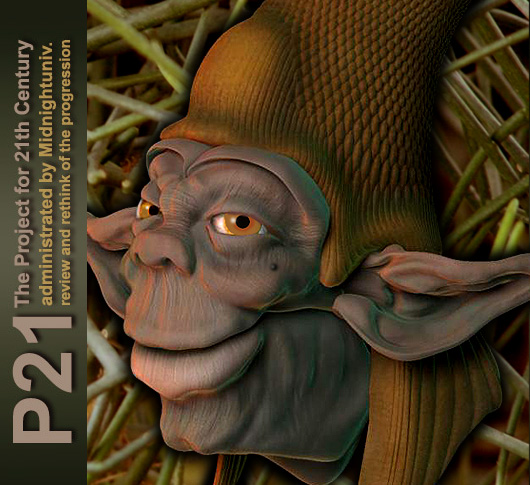

![]()
![]()
![]()
![]()
![]()
![]()
![]()
![]()
![]()
![]()
![]()


บรรณาธิการแถลง: บทความทุกชิ้นซึ่งได้รับการเผยแพร่บนเว็บไซต์แห่งนี้
มุ่งเพื่อประโยชน์สาธารณะ โดยเฉพาะอย่างยิ่ง เพื่อวัตถุประสงค์ในการขยายพรมแดนแห่งความรู้ให้กับสังคมไทยอย่างกว้างขวาง
นอกจากนี้ยังมุ่งทำหน้าที่เป็นยุ้งฉางเล็กๆ แห่งหนึ่งสำหรับเก็บสะสมความรู้ เพื่อให้ทุกคนสามารถหยิบฉวยไปใช้ได้ตามสะดวก
ในฐานะที่เป็นสมบัติร่วมของชุมชน สังคม และสมบัติที่ต่างช่วยกันสร้างสรรค์และดูแลรักษามาโดยตลอด.
สำหรับผู้สนใจร่วมนำเสนอบทความ หรือ แนะนำบทความที่น่าสนใจ(ในทุกๆสาขาวิชา) จากเว็บไซต์ต่างๆ
ทั่วโลก สามารถส่งบทความหรือแนะนำไปได้ที่ midnightuniv(at)gmail.com
(กองบรรณาธิการมหาวิทยาลัยเที่ยงคืน: ๒๘ มกาคม ๒๕๕๐)

Astrology - Astronomy
Midnight University
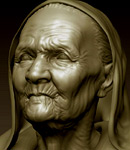
![]()
สารานุกรมเที่ยงคืน: โหราศาสตร์
และดาราศาสตร์
Astrology & Astronomy: โหราศาสตร์ในฐานะไส้ติ่งของวิทยาศาสตร์
สมเกียรติ
ตั้งนโม : เรียบเรียง
มหาวิทยาลัยเที่ยงคืน (ชุดความรู้เที่ยงคืน)
บทความวิชาการต่อไปนี้
เป็นเรื่องประวัติศาสตร์ความเป็นมาเกี่ยวกับโหราศาสตร์
ซึ่งได้รับการบันทึกไว้มากว่าสองพันปีก่อนคริสตกาล โหราศาสตร์ได้ส่งอิทธิพลไปสู่ความรู้
หลายด้านด้วยกันในอดีต รวมทั้งคำศัพท์ต่างๆ ในยุคปัจจุบันของเราที่ยังคงสะท้อนถึง
อิทธิพลของดวงดาวที่มีต่อวิถีชีวิต บุคลิกภาพ รวมถึงเหตุการณ์ต่างๆ บนโลก
ปัจจุบันโหราศาสตร์ตกอยู่ในภาวะที่ถูกดูถูก
เหยียดหยาม วิจารณ์ และกดทับ
อย่างมีสำนึกและปราศจากสำนึก จากโลกที่วาทกรรมวิทยาศาสตร์ครอบงำ
ด้วยเหตุนี้ โหราศาสตร์จึงไม่มีที่ทางของมันในศาสตร์สมัยใหม่ ไม่มีศักดิ์ศรี
และได้รับการประณามในฐานะที่เป็นความเชื่องมงาย ลึกลับ และปราศจากเหตุผล
สำหรับบนหน้าเว็บเพจนี้ เป็นเพียงการนำเสนอความรู้เกี่ยวกับโหราศาสตร์
เบื้องต้น เพื่อทำความเข้าใจและมองเห็นถึงความเป็นมาต่างๆ ของเรื่องเหล่านี้
คือ
- โหราศาสตร์ นิยามความหมาย
- จารีตต่างๆ ทางประวัติศาสตร์เกี่ยวกับโหราศาสตร์
- ประวัติศาสตร์เกี่ยวกับโหราศาสตร์โดยสังเขป
- โหราศาสตร์: อิทธิพลที่มีต่อวัฒนธรรมโลก
- โหราศาสตร์กับวิทยาศาสตร์
- อุปสรรคต่างๆ ของการวิจัย และข้อเรียกร้อง
- กลไกของวิชาโหราศาสตร์
midnightuniv(at)gmail.com
บทความเพื่อประโยชน์ทางการศึกษา
ข้อความที่ปรากฏบนเว็บเพจนี้
ได้รักษาเนื้อความตามต้นฉบับเดิมมากที่สุด
เพื่อนำเสนอเนื้อหาตามที่ผู้เขียนต้องการสื่อ กองบรรณาธิการเพียงตรวจสอบตัวสะกด
และปรับปรุงบางส่วนเพื่อความเหมาะสมสำหรับการเผยแพร่ รวมทั้งได้เว้นวรรค
ย่อหน้าใหม่ และจัดทำหัวข้อเพิ่มเติมสำหรับการค้นคว้าทางวิชาการ
บทความมหาวิทยาลัยเที่ยงคืน
ลำดับที่ ๑๓๘๕
เผยแพร่บนเว็บไซต์นี้ครั้งแรกเมื่อวันที่
๒๓ ตุลาคม ๒๕๕๐
(บทความทั้งหมดยาวประมาณ
๑๔.๕ หน้ากระดาษ A4)
+++++++++++++++++++++++++++++++++++++++++
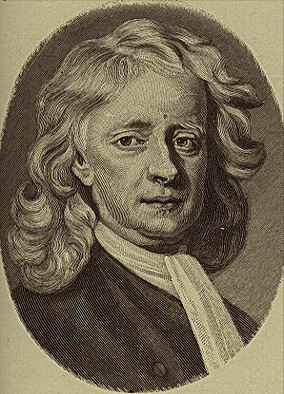
สารานุกรมเที่ยงคืน: โหราศาสตร์
และดาราศาสตร์
Astrology & Astronomy: โหราศาสตร์ในฐานะไส้ติ่งของวิทยาศาสตร์
สมเกียรติ
ตั้งนโม : เรียบเรียง
มหาวิทยาลัยเที่ยงคืน (ชุดความรู้เที่ยงคืน)
- English version
Quotation
Nature and nature's laws lay hid in night;
God said "Let Newton be" and all was light.
Alexander Pope - ข้อมูลจาก: http://en.wikiquote.org/wiki/Isaac_Newton
ธรรมชาติ และกฎธรรมชาติต่างๆ มันซ่อนเร้นอยู่ในยามค่ำคืน
พระผู้เป็นเจ้าทรงตรัสว่า "ปล่อยนิวตันให้อยู่ที่นั่น" และทุกอย่างก็จะสว่างขึ้นมาเอง
อเล็กซานเดอร์ โป๊ป
I have studied these
things - you have not.
ข้าพเจ้าศึกษาเรื่องเหล่านี้ - แต่ท่านไม่ได้ศึกษา
คำพูดดังกล่าวเป็นการตอบโต้ของนิวตัน (ค.ศ.1642-1727) เมื่อตอนที่ Edmund Halley
(นักดาราศาสตร์)ได้พูดถึงเรื่องศาสนาในลักษณะที่ไม่แสดงความเคารพ ซึ่งบันทึกไว้ในงานเรื่อง
The Life of Sir Issac Newton (ค.ศ.1831) ที่เขียนโดย David Brewster. คำพูดประโยคนี้มักได้รับการนำขึ้นมาอ้างเสมอในไม่กี่ปีที่ผ่านมา
ในฐานะที่เป็นคำพูดปกป้องเรื่องราวของโหราศาสตร์โดยเฉพาะ. นิวตันได้เขียนถึงความสำคัญของศาสตร์เกี่ยวกับการพยากรณ์เอาไว้อย่างแพร่หลาย
และการศึกษาเกี่ยวกับการเล่นแร่แปรธาตุในสมัยกลาง แต่มีหลักฐานน้อยมากว่าเขาได้ให้ความสนใจและเห็นด้วยกับเรื่องโหราศาสตร์.
Brewster ได้อ้างอิงเกร็ดประวัติศาสตร์ช่วงนี้ถึงนักดาราศาสตร์ Nevil Maskelyne
ซึ่งได้ส่งมอบหลักฐานดังกล่าวให้กับ ศาสตราจารย์ Stephen Peter Rigaud แห่งมหาวิทยาลัยออกฟอร์ด
อีกตอนหนึ่งที่มีการกล่าวถึงนิวตันกับเรื่องโหราศาสตร์คือ เขาได้ซื้อหนังสือเกี่ยวกับโหราศาสตร์มาเล่มหนึ่งเนื่องจากความอยากรู้อยากเห็น เพื่อตรวจสอบดูถึงสิ่งที่เป็นวิทยาศาสตร์ และอ่านมันจนกระทั่งเขาได้กลายเป็นบุคคลสำคัญเกี่ยวกับท้องฟ้า ซึ่งเขาไม่สามารถเข้าใจถึงความจำเป็นที่ต้องคุ้นเคยกับตรีโกณมิติ และเพื่อทำความเข้าใจรากฐานเกี่ยวกับสิ่งเหล่านั้น เขาได้ซื้อเรื่องของ Euclid พร้อมด้วยดัชนีเกี่ยวกับปัญหาต่างๆ ทั้งหมดในตอนท้ายมาอ่าน แต่อย่างไรก็ตาม กล่าวกันว่าเขาเพียงพลิกดูมันสองสามครั้ง ซึ่งเขาคิดว่าจำเป็นต่อวัตถุประสงค์ของเขาเท่านั้น และไม่ได้อ่านมันอีกเลย เว้นแต่ชื่อบทต่างๆ ในหนังสือเพื่อการค้นหาได้สะดวกมากขึ้น และเป็นหลักฐานส่วนตัวที่เขาสงสัยว่า ใครๆ ที่ต้องประสบกับความเจ็บปวดเกี่ยวกับการเขียนอธิบายหรือพิสูจน์เกี่ยวกับเรื่องเหล่านี้ และวางหนังสือ Euclid เอาไว้ข้างๆ ในฐานะที่เป็นหนังสือที่ไม่มีความสลักสำคัญอะไร ในไม่ช้า เขาก็มั่นใจถึงความไร้สาระและความว่างเปล่าเกี่ยวกับวิทยาศาสตร์ที่หลอกลวงของโหราศาสตร์
ข้างต้นนี้เป็นคำอธิบายของ
John Conduitt (สนใจต้นฉบับ สามารถคลิกอ่านรายละเอียดได้ที่: http://www.newtonproject.sussex.ac.uk/texts/viewtext.php?id=THEM00167&mode=normalized)
ซึ่งเป็นผู้ช่วยของนิวตันและเป็นสามีหลานสาวของเขา, สำหรับนิวตัวได้รับการพูดถึงว่า
เป็นนักศึกษาหนุ่ม ที่เคยอ่านหนังสือเกี่ยวกับโหราศาสตร์เล่มหนึ่ง และไม่ได้ประทับใจอะไรเกี่ยวกับมัน
ซึ่งเรื่องนี้ได้รับการยกขึ้นมาอ้างใน The Mathematical Papers of Isaac Newton
(1967) เขียนโดย D.T. Whiteside, M.A. Hoskin และ A. Prag, Vol. 1, pp. 15-19.
โหราศาสตร์ (Astrology):
นิยาม-ความหมาย
From Wikipedia, the free encyclopedia (http://en.wikipedia.org/wiki/Astrology)
คำว่าโหราศาสตร์ หรือ Astrology มาจากภาษากรีก คำว่า ast?r, astr?s, หมายถึง
"ดวงดาว"(star), บวกกับคำว่า l?gos, l?gou, หมายถึง "คำ"(word)
หรือ "คำพูด" (speech) ที่พูดถึงเรื่องเกี่ยวกับดวงดาว. โหราศาสตร์เป็นกลุ่มของระบบความความคิด
จารีตประเพณี และความเชื่อซึ่งเป็นเรื่องความรู้เกี่ยวกับตำแหน่งต่างๆ ที่สัมพันธ์กันของดวงดาวบนท้องฟ้า
และรายละเอียดเชิงสัมพัทธ์ต่างๆ ซึ่งถูกถือว่าเป็นประโยชน์ในการทำความเข้าใจ
ตีความ และเป็นข้อมูลเกี่ยวกับบุคลิกภาพ เรื่องราวของมนุษย์ รวมถึงสารัตถะเกี่ยวกับทางโลกที่รวบรวมขึ้นอย่างเป็นระบบ
นักปฏิบัติทางด้านโหราศาสตร์ได้รับการการเรียกว่า"นักโหราศาสตร์" (ในภาษาอังกฤษเรียกว่า
astrologer, หรือไม่บ่อยนักเรียกว่า astrologist)
ขนบประเพณีและแนวคิดโหราศาสตร์ในเชิงปฏิบัติจำนวนมาก
ถือกำเนิดขึ้นมานับตั้งแต่เริ่มมีการบันทึกเป็นลายลักษณ์อักษรเมื่อประมาณ 2,000
ปีก่อนคริสตศักราชมาเลยทีเดียว(1) โหราศาสตร์ช่วงต้นได้มีบทบาทอย่างสำคัญในการก่อรูปทางวัฒนธรรม,
และวิชาความรู้ต่างๆ หลายด้านตลอดช่วงเวลาในอดีต
(1) Robert Hand. The History of Astrology - Another
View.
ในเชิงประวัติศาสตร์ "โหราศาสตร์"และ"ดาราศาสตร์"(astrology and astronomy) บ่อยครั้งไม่สามารถที่จะจำแนกความแตกต่างออกจากกันได้ โดยจุดมุ่งหมายเพื่อต้องการความรู้เกี่ยวกับการพยากรณ์และการคาดการณ์ ซึ่งเป็นหนึ่งในปัจจัยที่เป็นแรงกระตุ้นมาแต่ต้นสำหรับการสังเกตการณ์ทางดาราศาสตร์. ดาราศาสตร์เริ่มแยกตัวจากโหราศาสตร์ หลังจากการค่อยๆ ฉีกตัวออกมาเป็นเวลายาวนานในคริสตศตวรรษที่ 18 และนับตั้งแต่การแยกตัวของดาราศาสตร์ ในฐานะการศึกษาทางด้านวิทยาศาสตร์ในเรื่องเทหวัตถุและปรากฎการณ์บนท้องฟ้า ความเกี่ยวพันกับโหราศาสตร์กับปรากฏการณ์เหล่านี้ ก็ไม่มีที่ทางหรือความสำคัญอีกต่อไป
ผู้ให้การสนับสนุนได้นิยามความหมายโหราศาสตร์เอาไว้อย่างหลากหลาย
ในฐานะที่เป็นภาษาเชิงสัญลักษณ์, รูปแบบศิลปศาสตร์สาขาหนึ่ง, วิทยาศาสตร์ และระเบียบวิธีเกี่ยวกับการพยากรณ์.
โดยทั่วไปชุมชนทางวิทยาศาสตร์พิจารณาเรื่องของโหราศาสตร์ในฐานะที่เป็นวิทยาศาสตร์เทียม(pseudoscience
- กล่าวคือมันมีกิจกรรมที่คล้ายๆ กับวิทยาศาสตร์แต่มีรากฐานมาจากสมมุติฐานที่ผิดพลาด)
หรือเป็นเรื่องของโชคลาง ไสยศาสตร์(2)(3) ขณะเดียวกัน ความเชื่อในเรื่องโหราศาสตร์ซึ่งแพร่หลายนั้น
ก็ไม่มีหลักฐานทางวิทยาศาสตร์ที่มารองรับเบื้องหลังหลักการต่างๆ เกี่ยวกับโหราศาสตร์
(2) WordNet 2.1. Princeton.
(3)
Activities With Astrology. Astronomical society of the Pacific.
จารีตต่างๆ ทางประวัติศาสตร์เกี่ยวกับโหราศาสตร์
ตลอดเวลาอันยาวนานของประวัติศาสตร์ โหราศาสตร์ค่อนข้างมีความโดดเด่นในหลายภูมิภาคบนโลก
และได้ผ่านประสบการณ์มายาวนานเกี่ยวกับการพัฒนา และมีการเปลี่ยนแปลงอยู่เสมอ
ตามหลักฐานเท่าที่ค้นพบ มีขนบจารีตมากมายเกี่ยวกับโหราศาสตร์ซึ่งมีความสำคัญทางประวัติศาสตร์
แต่ส่วนใหญ่แล้วไม่ได้ถูกนำมาใช้ประโยชน์แล้วในทุกวันนี้ จารีตที่สำคัญทางประวัติศาสตร์ของโหราศาสตร์ที่เรารับรู้กัน
อย่างเช่น
- โหราศาสตร์ของอาหรับและเปอร์เชีย (ดินแดนในตะวันออกกลางและตะวันออกใกล้)
- โหราศาสตร์ของชาวบาบีโลเนีย
- โหราศาสตร์ของอียิปต์
- โหราศาสตร์ของเฮเลน หรือกรีก
- โหราศาสตร์ของชาวมายัน
ส่วนผู้ที่สนใจเรื่องเกี่ยวกับโหราศาสตร์ในโลกตะวันตก, จีน, และอินเดีย สามารถที่จะค้นหาอ่านได้ใน ประวัติศาสตร์เกี่ยวกับโหราศาสตร์ (history of astrology) จากสารานุกรมวิกีพีเดีย ที่ http://en.wikipedia.org/wiki/History_of_astrology
ประวัติศาสตร์เกี่ยวกับโหราศาสตร์โดยสังเขป
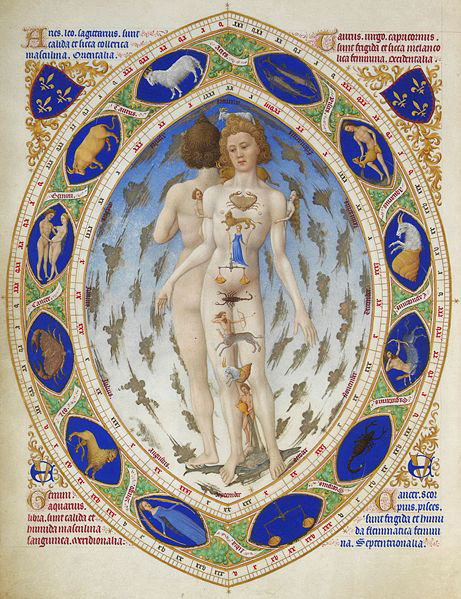
คำอธิบายภาพประกอบ
15th century image from the Tres Riches Heures du Duc
de Berry showing
believed relations between areas of the body and the zodiacal signs.
กำเนิด
ต้นกำเนิดต่างๆ เกี่ยวกับหลักการหรือทฤษฎีโหราศาสตร์จำนวนมาก รวมถึงวิธีการต่อมาภายหลังซึ่งพัฒนาขึ้นในเอเชีย
ยุโรป และตะวันออกกลาง ได้ถูกค้นพบท่ามกลางชาวบาบีโลเนียนโบราณ และระบบลางบอกเหตุบนท้องฟ้าของพวกเขาเริ่มได้รับการรวบรวมขึ้น
ราวช่วงกลาง 2,000 ปีก่อนคริสตศักราช. ระบบเกี่ยวกับการทำนายทายทักจากสรวงสวรรค์เหล่านี้
ต่อมาได้เแพร่กระจายผ่านบาบีโลเนียนและแอสซีเรียน สู่พื้นที่อื่นๆ อย่างเช่น
จีน อินเดีย และกรีก ทั้งโดยทางตรงและโดยอ้อม ซึ่งได้ผสมผสานรวมกับรูปแบบโหราศาสตร์ของท้องถิ่นที่มีอยู่ก่อนแล้ว
โหราศาสตร์ของบาบีโลเนียนนี้ เดิมทีได้มาถึงกรีกครั้งแรกราวกลางศตวรรษที่ 4 ก่อนคริสตกาล และถัดจากนั้นในช่วงปลายศตวรรษที่ 2 และต้นศตวรรษที่ 1 ก่อนคริสตศักราช หลังจากพระเจ้าอเล็กซานเดอร์ผู้พิชิต โหราศาสตร์บาบีโลเนียนก็ได้ผสมผสานกับโหราศาสตร์แบบจารีตของชาวอิยิปต์(decanic astrology) (โหราศาสตร์ที่เกี่ยวกับเครื่องหมาย(signs)ต่างๆ บนท้องฟ้าที่แบ่งออกเป็นส่วนๆ ห่างกันประมาณ 10 องศา, เป็นเรื่องของเทพเจ้าแห่งดาวเคราะห์บนสรวงสวรรค์ - ดูรายละเอียดเพิ่มเติมใน http://astrology.aryabhatt.com/astrology_glossary.asp) และสร้างสรรค์จนก่อเกิดโหราศาสตร์แบบ horoscopic astrology (โหราศาสตร์ทำนายดวงชะตา)(horoscope - a forecast of a person's future based on the relative positions of the stars and planets at the time of their birth). รูปแบบใหม่ของโหราศาสตร์นี้ ปรากฏว่าได้มีการก่อกำเนิดขึ้นในเมืองอเล็กซานเดรียนของอียิบต์ และได้แพร่ขยายออกไปอย่างรวดเร็ว ข้ามจากโลกเก่าไปยังทวีปยุโรป ตะวันออกกกลาง และอินเดีย
ก่อนการปฏิวัติวิทยาศาสตร์
จากยุคคลาสสิคถึงการปฏิวัติวิทยาศาสตร์ การฝึกฝนทางโหราศาสตร์ได้แสดงบทบาทสำคัญในความรู้ที่ก้าวหน้าทางดาราศาสตร์
คณิตศาสตร์ แพทย์ศาสตร์ และจิตวิทยา. อิทธิพลของโหราศาสตร์รวมไปถึงการสังเกตการณ์และการติดตามเทหวัตถุบนฟากฟ้าเป็นเวลานานๆ
เป็นเรื่องที่ไม่น่าประหลาดใจใดๆ ที่บรรดานักโหราศาสตร์ได้เป็นคนที่ตระเตรียมเอกสารอย่างเป็นระบบ
เกี่ยวกับการเคลื่อนไหวต่างๆ ของดวงอาทิตย์, ดวงจันทร์, ดวงดาว, และดาวเคราะห์ต่างๆ
ขึ้นมาเป็นครั้งแรก
ความแตกต่างระหว่าง"ดาราศาสตร์"และ"โหราศาสตร์"ผันแปรจากที่หนึ่งไปยังอีกที่หนึ่ง พวกมันเป็นเรื่องที่คลุมเครือจนไม่อาจแยกจากกันได้ในบาบีโลเนียโบราณ และส่วนใหญ่ของดินแดนตะวันออกกลาง แต่มันค่อนข้างแยกจากกันอย่างชัดเจนกว่าในอารยธรรมกรีกโบราณ. โหราศาสตร์มักไม่ค่อยได้รับการยอมรับ โดยไม่มีการวิพากษ์วิจารณ์ก่อนยุคสมัยใหม่ บ่อยทีเดียว มันได้รับการท้าทายโดยนักวิมตินิยมชาวเฮเลน(กรีก)(Hellenistic skeptics), อำนาจจากศาสนาจักร, และบรรดานักคิดในยุคกลาง
แบบแผนเกี่ยวกับความรู้ทางด้านดาราศาสตร์
ซึ่งได้รับมาจากความมานะพยายามของโหราศาสตร์ได้รับการทำซ้ำ ข้ามผ่านวัฒนธรรมหลายหลากเป็นจำนวนมากในประวัติศาสตร์
จากอินเดียโบราณ ตลอดจนกระทั่งถึงอารยธรรมมายาคลาสสิค ถึงยุโรปสมัยกลาง. การหนุนเนื่องทางประวัติศาสตร์นี้
โหราศาสตร์ได้รับการเรียกว่า protoscience (วิทยาศาสตร์บุพกาล - ก่อนวิทยาศาสตร์)
และ pseudoscience (วิทยาศาสตร์เทียม อย่างเช่น การเล่นแร่แปรธาตุ)(alchemy).
บรรดานักวิทยาศาสตร์ที่โดเด่นจำนวนมาก อย่างเช่น โคเปอร์นิคัส, กาลิเลโอ, เคปเลอร์
และคาร์ล จุง (Nicholas Copernicus, Galileo Galilei, Johannes Kepler, Carl
Jung)และคนอื่นๆ ได้มีปฏิบัติการหรือให้การสนับสนุนนอย่างมีนัยสำคัญต่อโหราศาสตร์
(4)
(4) Bruce Scofield. Were They Astrologers? - Big League
Scientists and Astrology. The Mountain Astrologer magazine.
โหราศาสตร์: อิทธิพลที่มีต่อวัฒนธรรมโลก
โหราศาสตร์มีผลหรืออิทธิพลอย่างลึกซึ้งต่ออดีตในช่วงพันปีที่ผ่านมา ทั้งในวัฒนธรรมตะวันตกและตะวันออก.
ในช่วงยุคกลาง คนที่ได้รับการศึกษาของห้วงเวลาดังกล่าวเชื่อถือในโหราศาสตร์ว่า
มันเป็นระบบของอาณาบริเวณและวัตถุสสารแห่งท้องฟ้า ซึ่งได้รับการเชื่อถือว่าสะท้อนอยู่ในระบบความรู้และโลกที่อยู่ต่ำลงมาของมัน
โหราศาสตร์มีอิทธิพลต่อเรื่องของภาษาและวรรณคดี ยกตัวอย่างเช่นคำว่า influenza (ไข้หวัดใหญ่) มาจากภาษาลาตินสมัยกลางว่า influentia หมายถึง influence (อิทธิพล), ที่มีชื่อเรียกเช่นนั้นก็เพราะ บรรดานายแพทย์ทั้งหลายต่างเชื่อว่า การระบาดของไข้หวัดใหญ่ มีสาเหตุอันเนื่องมาจากดาวเคราะห์ร้ายอันไม่พึงประสงค์และอิทธิพลของดวงดาว. คำว่า disaster (หายนะ) มาจากภาษาลาติน dis-aster หมายถึง bad star (ดาวร้าย) หรือตัวอย่างของคำคุณศัพท์ต่างๆ ที่ได้รับอิทธิพลจากโหราศาสตร์ เช่น
- lunatic (บ้า, วิกลจริต) (luna / moon)
- mercurial (กระฉับกระเฉง, มีชีวิตชีวา, คล่องแคล่ว, เปลี่ยนแปลงง่าย) (mercury - ดาวพุธ)
- venereal (กามโรค, เกี่ยวกับการสังวาส, ความต้องการทางเพศ) (venus - ดาวศุกร์)
- martial (ชอบรบ, สงคราม, กล้าหาญ, กองทัพ) (mars - ดาวอังคาร)
- jovial (เบิกบานใจ, ร่าเริง, สนุกสนาน) (jupiter - ดาวพฤหัส)
- saturnine (อาการเซื่องซึม, เฉื่อยเนือย, หงอยเหงา) (saturn - ดาวเสาร์)
Zodiac in a 6th century synagogue at Beit Alpha, Israel.
เหล่านี้ล้วนเป็นคำเก่าที่ใช้เพื่ออธิบายคุณสมบัติของบุคคล ที่ได้รับการกล่าวว่ามีความคล้ายคลึงกับคุณลักษณ์ของดาวเคราะห์ต่างๆ ในทางโหราศาสตร์ ซึ่งบางคำรับเอามาจากคุณลักษณ์ต่างๆ ของเทพเจ้าของชาวโรมันโบราณที่ถูกเรียกต่อมาภายหลัง
ในทางวรรณคดี นักเขียนเป็นจำนวนมากที่โดดเด่น
เช่น Geoffrey Chaucer (5) and William Shakespeare, (6) ได้ใช้สัญลักษณ์ทางโหราศาสตร์เพื่อเพิ่มเติมรายละเอียดและความแตกต่างในการอรรถาธิบายแรงกระตุ้นในตัวละครต่างๆของพวกเขา.
บ่อยครั้ง การทำความเข้าใจเกี่ยวกับสัญลักษณ์ดวงดาว เป็นที่ต้องการเพื่อการทำความซาบซึ้งอย่างเต็มที่ในเชิงวรรณกรรม
(5) A.B.P. Mattar et al. Astronomy and Astrology in
the Works of Chaucer. University of Singapore. Retrieved on 2006-07-17.
(6) P. Brown. Shakespeare, Astrology, and Alchemy: A
Critical and Historical Perspective. The Mountain Astrologer, Feb/Mar 2004.
นักคิดสมัยใหม่บางคนที่มีชื่อเสียง อย่างเช่น Carl Jung (7), เชื่อในอำนาจอธิบายของโหราศาสตร์เกี่ยวกับเรื่องจิตใจโดยไม่จำต้องรับรองหรือเห็นด้วยกับการทำนายทายทักของมัน.
ในการศึกษาทางด้านโหราศาสตร์ ได้ถูกสะท้อนในการศึกษาระดับมหาวิทยาลัยในช่วงสมัยกลางของยุโรป
ซึ่งได้รับการแบ่งแยกออกเป็น 7 พื้นที่ แต่ละพื้นที่หรือขอบเขตการศึกษาถูกแทนโดยดาวเคราะห์แต่ละดวง
และถูกรู้จักในฐานะที่เป็นความรู้ทางด้านศิลปศาสตร์(liberal arts) 7 สาขา (8).
Dante Alighieri คาดการณ์ว่า ศิลปะเหล่านี้ได้เจริญงอกงามเข้าสู่ศาสตร์ต่างๆ
ที่เรารู้จักกันกระทั่งทุกวันนี้ ซึ่งเข้ารูปกระชับกับโครงสร้างเดียวกันคล้ายดาวเคราะห์ทั้งหลาย.
ในทางดนตรี ตัวอย่างที่รู้จักกันดีเกี่ยวกับอิทธิพลของโหราศาสตร์ก็คือ ในบทเพลงวงออร์เคสตร้าที่ชื่อว่า
The Planets Op.32 (9) โดยประพันธกรชาวอังกฤษ Gustav Holst กรอบโครงดังกล่าววางอยู่บนรากฐานสัญลักษณ์ทางโหราศาสตร์เกี่ยวกับดาวเคราะห์ต่างๆ
(7)
Carl G. Jung, "Archetypes of the Collective Unconscious," excerpted
in The Basic Writings of C.G. Jung (Modern Library, repr. 1993), 362-363.
(8) the seven liberal arts were: the trivium 1. grammar 2. rhetoric 3. logic
และ the quadrivium 4. geometry 5. arithmetic 6. music 7. astronomy (the trivium
หมายถึงความรู้ 3 สาขาวิชา อันเป็นรากฐานของศิลปศาสตร์, the quadrivium หมายถึง
ความรู้ 4 สาขา ที่ต่อจาก the trivium อันเป็นความสมบูรณ์ของศิลปศาสตร์)
(9) http://en.wikipedia.org/wiki/The_Planets
โหราศาสตร์กับวิทยาศาสตร์
ในช่วงเวลาของ Francis Bacon (ค.ศ.1561-1626) และการปฏิวัติวิทยาศาสตร์ สาขาวิชาวิทยาศาสตร์ใหม่ได้ปรากฏตัวขึ้นมา
ความรู้ใหม่นี้เรียกร้องวิธีการอุปนัยในเชิงประจักษ์อย่างเป็นระบบ ซึ่งเป็นการหาเหตุผลโดยการสังเกต
ทดลอง และได้นำไปสู่การปฏิวัติวิทยาศาสตร์. ณ จุดนี้ โหราศาสตร์และดาราศาสตร์เริ่มแยกออกจากกัน
ดาราศาสตร์กลายเป็นหนึ่งในแกนกลางของวิทยาศาสตร์ ในขณะที่โหราศาสตร์ได้รับการมองในฐานะที่เป็นศาสตร์เกี่ยวกับเวทมนต์และความลึกลับมากขึ้น(occult
science) หรือไสยศาสตร์ โดยบรรดานักวิทยาศาสตร์ธรรมชาติ. การแบ่งแยกกันนี้ ได้ก่อตัวขึ้นตลอดคริสตศวตวรรษที่
18-19 เป็นต้นมา (10)
(10) Jim Tester, A History of Western Astrology (Ballantine
Books, 1989), 240ff.
โหราศาสตร์ได้ถูกวิพากษ์วิจารณ์ในฐานะที่ไม่เป็นวิทยาศาสตร์ ทั้งโดยวงการวิทยาศาสตร์ และโดยบรรดานักวิทยาศาสตร์เป็นคนๆ และมันได้รับการปิดป้ายฉลากในฐานะที่เป็นวิทยาศาสตร์เทียม. ในปี ค.ศ. 1975 สมาคมมนุษยศาสตร์อเมริกัน(the American Humanist Association) ได้ตีพิมพ์แถลงการณ์ชิ้นหนึ่งซึ่งเป็นที่รู้จักกันอย่างกว้างขวาง เกี่ยวกับการวิจารณ์สมัยใหม่ในเรื่องโหราศาสตร์ ซึ่งได้อธิบายคุณลักษณะของคนเหล่านั้นที่ยังคงมีศรัทธาอย่างต่อเนื่องในเรื่องดังกล่าว "ทั้งๆ ที่มีข้อเท็จจริงที่ว่า มันไม่มีพื้นฐานทางวิทยาศาสตร์มายืนยันความจริงสำหรับความเชื่อต่างๆ ของพวกเขา และอันที่จริงนั้น มันมีหลักฐานหรือพยานยืนยันที่หนักแน่นไปในทิศทางตรงข้าม"
นักดาราศาสตร์ Carl Sagan (1934-1996) มิได้เซ็นชื่อในแถลงการณ์ฉบับนี้ และเขาได้หมายเหตุไว้ว่า ขณะที่เขารู้สึกว่าโหราศาสตร์ขาดเสียซึ่งความมีเหตุมีผล แต่เขาพบว่า น้ำเสียงของแถลงการณ์ดังกล่าวแสดงออกมาในลักษณะเผด็จการ-อำนาจนิยม เขาเสนอแนะว่า การขาดเสียซึ่งกลไกแห่งเหตุและผลสำหรับโหราศาสตร์ เขารู้สึกเห็นพ้องด้วย แต่ไม่ได้เห็นด้วยกับวิธีการจูงใจในแถลงการณ์ฉบับนั้น
อุปสรรคต่างๆ ของการวิจัย
และข้อเรียกร้อง
แม้ว่าโหราศาสตร์จะไม่ได้รับการยอมรับจากจุดยืนวิทยาศาสตร์ในบางครั้ง แต่นับจากเริ่มต้นคริสตศตวรรษที่
20 เป็นต้นมา มันก็เป็นหัวข้อที่มีการวิจัยกันมากในท่ามกลางนักโหราศาสตร์ทั้งหลาย.
บรรดานักโหราศาสตร์ให้เหตุผลว่า มันมีอุปสรรคสำคัญในการดำเนินการวิจัยเชิงวิทยาศาสตร์ให้บรรลุผลสำเร็จในเรื่องโหราศาสตร์ในทุกวันนี้
รวมถึงการได้รับทุนในกิจกรรมดังกล่าว ทั้งนี้เนื่องมาจาก การขาดเสียซึ่งภูมิหลังทางวิทยาศาสตร์และวิชาการเชิงสถิติของบรรดานักโหราศาสตร์
ประกอบกับความรู้ความชำนาญที่ไม่เพียงพอในด้านโหราศาสตร์โดยบรรดานักวิจัยด้านวิทยาศาสตร์
มีนิตยสารอยู่เพียงไม่กี่ฉบับที่เกี่ยวข้องกับงานวิจัยวิทยาศาสตร์ในด้านโหราศาสตร์ (ยกตัวอย่างเช่น นิตยสารโหราศาสตร์ที่มุ่งความสนใจไปในการวิจัยทางวิทยาศาสตร์ หรือนิตยสารวิทยาศาสตร์ที่ตีพิมพ์งานวิจัยทางโหราศาสตร์). นักโหราศาสตร์บางคนได้ให้เหตุผลว่า ทุกวันนี้มีนักปฏิบัติการไม่มากนัก ที่ดำเนินรอยตามการทดสอบทางวิทยาศาสตร์กับโหราศาสตร์ เพราะพวกเขารู้สึกว่าทำงานกับลูกค้าต่างๆ บนพื้นฐานของชีวิตประจำวัน ที่ได้ช่วยจัดหาเหตุผลส่วนตัวให้กับผู้คนเหล่านั้น ก็เป็นการเพียงพอแล้วสำหรับวิชาชีพ
ข้ออ้างอีกอันหนึ่งโดยบรรดานักโหราศาสตร์ทั้งหลายก็คือ การศึกษาส่วนใหญ่ทางด้านโหราศาสตร์มิได้สะท้อนธรรมชาติเกี่ยวกับปฏิบัติการทางโหราศาสตร์ และวิธีการทดลองเท่าที่มีอยู่รวมถึงเครื่องไม้เครื่องมือการวิจัยก็ไม่เพียงพอ สำหรับการศึกษาหลักวิชาที่สลับซับซ้อนนี้. ผู้ให้การสนับสนุนโหราศาสตร์บางคนอ้างว่า ท่าทีที่แผ่คลุมและแรงกระตุ้นต่างๆ ของผู้เป็นปรปักษ์กับโหราศาสตร์จำนวนมาก ได้แสดงออกซึ่งอคติอย่างมีสำนึกและอย่างปราศจากสำนึก โดยเฉพาะที่มีต่อการสร้างสมมุติฐานต่างๆ ที่ถูกนำมาทดสอบ, ปฏิบัติการเกี่ยวกับการทดสอบต่างๆ, รวมไปถึงการรายงานผลทั้งหลายด้วย
กลไกของวิชาโหราศาสตร์
บทบรรณาธิการชิ้นหนึ่งโดย the Astronomical Society of the Pacific (สมาคมดาราศาสตร์ภาคพื้นแปซิฟิค)ได้รายงานว่า
พวกเขาไม่สามารถค้นพบหลักฐานใดๆ สำหรับกลไกทางด้านวิทยาศาสตร์ที่อธิบายว่า เทหวัตถุบนฟากฟ้าสามารถมีอิทธิพลต่อเรื่องราวบนโลกที่ทึกทักกันได้.
แม้ว่ากลไกต่างๆ ทางกายภาพ ยังคงอยู่ท่ามกลางทฤษฎีต่างๆ ที่มีการนำเสนอเกี่ยวกับโหราศาสตร์
บรรดานักโหราศาสตร์สมัยใหม่จำนวนไม่มากนักเชื่อในความสัมพันธ์เชิงเหตุและผลระหว่าง"มวลวัตถุหรือดวงดาวบนท้องฟ้า"
กับ"เหตุการณ์ต่างๆ บนโลก". บางคนได้วางหลักความเกี่ยวพันกันอย่างบริสุทธิ์,
ในความสัมพันธ์ระหว่าง "การสังเกตในทางโหราศาสตร์" กับ"เหตุการณ์ต่างๆ"
อย่างเช่น ทฤษฎีการเกิดขึ้นพร้อมกัน(theory of synchronicity) ที่ได้รับการเสนอโดย
Carl Jung (11)
(11) Maggie Hyde, Jung and Astrology. The Aquarian Press
(London, 1992) p. 24-26.
ส่วนบางคนได้วางพื้นฐานในการพยากรณ์ และคนอื่นๆ ยังคงให้เหตุผลว่า ความเกี่ยวพันกันในเชิงประจักษ์สามารถยืนอยู่บนญานวิทยาหรือทฤษฎีความรู้ของตัวมันเอง และไม่ต้องการความสนับสนุนจากทฤษฎีหรือกลไกใดๆ ที่นอกไปจากความรู้ด้านโหราศาสตร์. นักสังเกตการณ์บางคนคิดว่า แนวคิดที่ไม่มีลักษณะเป็นกลไกเหล่านี้ได้ก่อให้เกิดคำถามที่จริงจังเกี่ยวกับความเป็นไปได้ของโหราศาสตร์ที่มีเหตุผล โดยผ่านการทดสอบทางวิทยาศาสตร์ และบางคนได้ไปไกลมาก เกี่ยวกับการปฏิเสธการประยุกต์ใช้วิธีการทางวิทยาศาสตร์กับโหราศาสตร์เกือบจะโดยสิ้นเชิง
ในอีกด้านหนึ่งนั้น นักโหราศาสตร์บางคนเชื่อว่า โหราศาสตร์เป็นเรื่องที่ยอมให้มีการทดสอบได้ด้วยวิธีการทางวิทยาศาสตร์ โดยวิธีการวิเคราะห์ที่มีความเชี่ยวชาญเพียงพอ และพวกเขาอ้างถึงการศึกษานำร่องต่างๆ ที่พวกเขานำมาสนับสนุนทัศนะนี้. นักโหราศาสตร์หลายคนเรียกร้องหรือสนับสนุนการศึกษาอย่างต่อเนื่องเกี่ยวกับโหราศาสตร์ โดยมีพื้นฐานอยู่บนความมีเหตุมีผลเชิงสถิติ
บรรณานุกรม
- http://www.newtonproject.sussex.ac.uk/texts/viewtext.php?id=THEM00167&mode=normalized
- http://en.wikiquote.org/wiki/Isaac_Newton
- http://en.wikipedia.org/wiki/Astrology
+++++++++++++++++++++++++++++++++++++++++
ภาษาอังกฤษ
Astrology vs astronomy
Nature and nature's laws lay hid in night;
God said "Let Newton be" and all was light.
Alexander Pope
link for more detail http://en.wikiquote.org/wiki/Isaac_Newton
I have studied these
things - you have not.
Reported as Newton's response, whenever Edmond Halley would say anything disrespectful
of religion, by Sir David Brewster in The Life of Sir Isaac Newton (1831).
This has often been quoted in recent years as having been a statement specifically
defending Astrology. Newton wrote extensively on the importance of Prophecy,
and studied Alchemy, but there is little evidence that he took favourable
notice of Astrology. Brewster attributes the anecdote to the astronomer Nevil
Maskelyne who passed it on to Oxford professor Stephen Peter Rigaud.
Quote about Newton
He bought a book of Iudicial Astrology out of a curiosity to see what there
was in that science & read in it till he came to a figure of the heavens
which he could not understand for want of being acquainted with Trigonometry,
& to understand the ground of that bought an English Euclid with an Index
of all the problems at the end of it & only turned to two or three which
he thought necessary for his purpose & read nothing but the titles of
them finding them so easy & self evident that he wondered any body would
be at the pains of writing a demonstration of them & laid Euclid aside
as a trifling book, & was soon convinced of the vanity & emptiness
of the pretended science of Iudicial astrology.
- An account by John Conduitt, Newton's assistant and his neice's husband, of Newton saying that, as a young student, he had read a book on astrology and was not impressed with it. Also quoted in The Mathematical Papers of Isaac Newton (1967) by D.T. Whiteside, M.A. Hoskin and A. Prag, Vol. 1, pp. 15-19.
Astrology
Astrology (from Greek: ast?r, astr?s), "star", and (l?gos, l?gou),
"word" or "speech" lit. to talk about the stars) is a
group of systems, traditions, and beliefs in which knowledge of the relative
positions of celestial bodies and related details is held to be useful in
understanding, interpreting, and organizing information about personality,
human affairs, and other terrestrial matters. A practitioner of astrology
is called an astrologer, or, less often, an astrologist. Numerous traditions
and applications employing astrological concepts have arisen since its earliest
recorded beginnings in the 2nd millennium BCE.[1] It has played a role in
the shaping of culture, early astronomy, and other disciplines throughout
history.
Historically, astrology and astronomy were often indistinguishable, with the desire for predictive and divinatory knowledge one of the primary motivating factors for astronomical observation. Astronomy began to diverge from astrology after a long period of gradual separation in the 18th century, and has since distinguished itself as the scientific study of astronomical objects and phenomena, placing no significance on these phenomena's supposed astrological correlation.
Proponents have defined astrology variously, as a symbolic language,[2][3] an art form,[4] a science,[4] and a method of divination.[5][6] The scientific community generally considers astrology as a pseudoscience or superstition.[7][8] While there is no scientific evidence behind the principles of astrology, belief in astrology is widespread.[9][10][11][12]
Historical traditions
Throughout its long history, astrology has come to prominence in many regions
and undergone developments and change. There are many astrological traditions
that are historically important, but which have largely fallen out of use
today. Astrologers still retain an interest in them and regard them as an
important resource. Historically significant traditions of astrology include:
- Arab and Persian astrology (Medieval, near Eastern)
- Babylonian astrology (Ancient, near East)
- Egyptian astrology
- Hellenistic astrology (Classical antiquity)
- Mayan astrology
The history of Western, Chinese, and Indian astrology is discussed in the main article history of astrology.
History of astrology
Origins
The origins of much of the astrological doctrine and method that would later
develop in Asia, Europe, and the Middle East are found among the ancient Babylonians
and their system of celestial omens that began to be compiled around the middle
of the 2nd millennium BCE. This system of celestial omens later spread either
directly or indirectly through the Babylonians and Assyrians to other areas
such as India, China, and Greece where it merged with pre-existing indigenous
forms of astrology.[citation needed]. This Babylonian astrology came to Greece
initially as early as the middle of the 4th century BCE, and then around the
late 2nd or early 1st century BCE after the Alexandrian conquests, this Babylonian
astrology was mixed with the Egyptian tradition of decanic astrology to create
horoscopic astrology. This new form of astrology, which appears to have originated
in Alexandrian Egypt, quickly spread across the ancient world into Europe,
the Middle East and India.
Before the scientific
revolution
From the classical period through the scientific revolution, astrological
training played a critical role in advancing astronomical, mathematical, medical
and psychological knowledge. Astrological influences included the observation
and long-term tracking of celestial objects. It was astrologers who provided
the first systematic documentation of the movements of the Sun, the Moon,
the planets, and the stars. The differentiation between astronomy and astrology
varied from place to place; they were indistinguishable in ancient Babylonia
and for most of the Middle Ages, but separated to a greater degree in ancient
Greece (see astrology and astronomy). Astrology was not always uncritically
accepted before the modern era; it was often challenged by Hellenistic skeptics,
church authorities, and medieval thinkers.
The pattern of astronomical knowledge gained from astrological endeavours has been historically repeated across numerous cultures, from ancient India through the classical Maya civilization to medieval Europe. Given this historical contribution, astrology has been called a protoscience along with pseudosciences such as alchemy (see "Western astrology and alchemy" below).
Many prominent scientists, such as Nicholas Copernicus, Galileo Galilei, Tycho Brahe, Johannes Kepler, Carl Jung and others, practiced or significantly contributed to astrology.[16]
Effects on world culture
Astrology has had a profound influence over the past few thousand years on
Western and Eastern cultures. In the Middle Ages, when the educated of the
time believed in astrology, the system of heavenly spheres and bodies was
believed to reflect on the system of knowledge and the world itself below.
Astrology has had an influence on both language and literature. For example, influenza, from medieval Latin influentia meaning influence, was so named because doctors once believed epidemics to be caused by unfavorable planetary and stellar influences. The word "disaster" comes from the Latin dis-aster meaning "bad star". Adjectives "lunatic" (Luna/Moon), "mercurial" (Mercury), "venereal" (Venus), "martial" (Mars), "jovial" (Jupiter/Jove), and "saturnine" (Saturn) are all old words used to describe personal qualities said to resemble or be highly influenced by the astrological characteristics of the planet, some of which are derived from the attributes of the ancient Roman gods they are named after. In literature, many writers, notably Geoffrey Chaucer[17][18][19] and William Shakespeare,[20][21] used astrological symbolism to add subtlety and nuance to the description of their characters' motivation(s). Often, an understanding of astrological symbolism is needed to fully appreciate such literature.
Some modern thinkers, notably Carl Jung,[22] believe in astrology's descriptive powers regarding the mind without necessarily subscribing to its predictive claims. In education astrology is reflected in the university education of medieval Europe, which was divided into seven distinct areas, each represented by a particular planet and known as the seven liberal arts. Dante Alighieri speculated that these arts, which grew into the sciences we know today, fitted the same structure as the planets. In music the best known example of astrology's influence is in the orchestral suite called "The Planets" by the British composer Gustav Holst, the framework of which is based upon the astrological symbolism of the planets.
Astrology and science
By the time of Francis Bacon and the scientific revolution, newly emerging
scientific disciplines acquired a method of systematic empirical induction
validated by experimental observations, which led to the scientific revolution.[23]
At this point, astrology and astronomy began to diverge; astronomy became
one of the central sciences while astrology was increasingly viewed as an
occult science or superstition by natural scientists. This separation accelerated
through the eighteenth and nineteenth centuries.[24]
Astrology has been criticized as being unscientific both by scientific bodies and by individual scientists.[25][26] and has been labeled as a pseudoscience.[27] In 1975, the American Humanist Association published one of the most widely known modern criticisms of astrology, characterizing those who continue to have faith in the subject as doing so "in spite of the fact that there is no verified scientific basis for their beliefs, and indeed that there is strong evidence to the contrary".[9] Astronomer Carl Sagan did not sign the statement, noting that, while he felt astrology lacked validity, he found the statement's tone authoritarian. He suggested that the lack of a causal mechanism for astrology was relevant but not in itself convincing.[28][29]
Although astrology has had no accepted scientific standing for some time, it has been the subject of much research among astrologers since the beginning of the twentieth century. In his landmark study of twentieth-century research into natal astrology, vocal astrology critic Geoffrey Dean noted and documented the burgeoning research activity, primarily within the astrological community.[30]
Claims about obstacles
to research
Astrologers have argued that there are significant obstacles in carrying out
scientific research into astrology today, including funding,[31][32] lack
of background in science and statistics by astrologers,[33] and insufficient
expertise in astrology by research scientists.[34][31][32] There are only
a handful of journals dealing with scientific research into astrology (i.e.
astrological journals directed towards scientific research or scientific journals
publishing astrological research). Some astrologers have argued that few practitioners
today pursue scientific testing of astrology because they feel that working
with clients on a daily basis provides a personal validation for them.[32][35]
Another argument made by astrologers is that most studies of astrology do
not reflect the nature of astrological practice and that existing experimental
methods and research tools are not adequate for studying this complex discipline.[36][37]
Some astrology proponents claim that the prevailing attitudes and motives
of many opponents of astrology introduce conscious or unconscious bias in
the formulation of hypotheses to be tested, the conduct of the tests, and
the reporting of results.[34]
Mechanism
An editorial published by the Astronomical Society of the Pacific reports
that they can find no evidence for a scientifically defined mechanism by which
celestial objects can supposedly influence terrestrial affairs.[8] Though
physical mechanisms are still among the proposed theories of astrology,[38][39]
few modern astrologers believe in a direct causal relationship between heavenly
bodies and earthly events.[32] Some have posited acausal, purely correlative,
relationships between astrological observations and events, such as the theory
of synchronicity proposed by Carl Jung.[40] Others have posited a basis in
divination.[41]
Still others have argued that empirical correlations can stand on their own epistemologically, and do not need the support of any theory or mechanism.[34] To some observers, these non-mechanistic concepts raise serious questions about the feasibility of validating astrology through scientific testing, and some have gone so far as to reject the applicability of the scientific method to astrology almost entirely.[34]
Some astrologers, on the other hand, believe that astrology is amenable to the scientific method, given sufficiently sophisticated analytical methods, and they cite pilot studies they claim support this view.[42] Consequently, several astrologers have called for or advocated continuing studies of astrology based on statistical validation.[43]
http://en.wikipedia.org/wiki/Astrology
http://en.mimi.hu/astrology/decanate.html
++++++++++++++++++++++++++++++++++++++++++
นักศึกษา
สมาชิก และผู้สนใจบทความมหาวิทยาลัยเที่ยงคืน
ก่อนหน้านี้ สามารถคลิกไปอ่านได้โดยคลิกที่แบนเนอร์
ไปหน้าแรกของมหาวิทยาลัยเที่ยงคืน
I สมัครสมาชิก I สารบัญเนื้อหา 1I สารบัญเนื้อหา 2 I
สารบัญเนื้อหา 3 I สารบัญเนื้อหา
4
I สารบัญเนื้อหา
5 I สารบัญเนื้อหา
6
ประวัติ
ม.เที่ยงคืน
สารานุกรมลัทธิหลังสมัยใหม่และความรู้เกี่ยวเนื่อง
e-mail :
midnightuniv(at)gmail.com
หากประสบปัญหาการส่ง
e-mail ถึงมหาวิทยาลัยเที่ยงคืนจากเดิม
[email protected]
ให้ส่งไปที่ใหม่คือ
midnight2545(at)yahoo.com
มหาวิทยาลัยเที่ยงคืนจะได้รับจดหมายเหมือนเดิม
มหาวิทยาลัยเที่ยงคืนกำลังจัดทำบทความที่เผยแพร่บนเว็บไซต์ทั้งหมด
กว่า 1300 เรื่อง หนากว่า 25000 หน้า
ในรูปของ CD-ROM เพื่อบริการให้กับสมาชิกและผู้สนใจทุกท่านในราคา 150 บาท(รวมค่าส่ง)
(เริ่มปรับราคาตั้งแต่วันที่ 1 กันยายน 2548)
เพื่อสะดวกสำหรับสมาชิกในการค้นคว้า
สนใจสั่งซื้อได้ที่ midnightuniv(at)gmail.com หรือ
midnight2545(at)yahoo.com
สมเกียรติ
ตั้งนโม และคณาจารย์มหาวิทยาลัยเที่ยงคืน
(บรรณาธิการเว็บไซค์ มหาวิทยาลัยเที่ยงคืน)
หากสมาชิก ผู้สนใจ และองค์กรใด ประสงค์จะสนับสนุนการเผยแพร่ความรู้เพื่อเป็นวิทยาทานแก่ชุมชน
และสังคมไทยสามารถให้การสนับสนุนได้ที่บัญชีเงินฝากออมทรัพย์ ในนาม สมเกียรติ
ตั้งนโม
หมายเลขบัญชี xxx-x-xxxxx-x ธนาคารกรุงไทยฯ สำนักงานถนนสุเทพ อ.เมือง จ.เชียงใหม่
หรือติดต่อมาที่ midnightuniv(at)yahoo.com หรือ midnight2545(at)yahoo.com
1
2
3
4
5
6
7
8
9
10
11
12
13
14
15
16
17
18
19
20
21
22
23
24
25
26
27
28
29
30
31
32
33
34
35
36
37
38
39
40
41
42
43
44
45
46
47
48
49
50
51
52
53
54
55
56
57
58
59
60
61
62
63
64
65
66
67
68
69
70
71
72
73
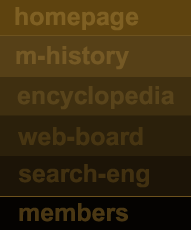























Isaac Newton
Sir Isaac Newton, (December 25, 1642, old style or January 4, 1643, new style - March 20, 1727, old style, or March 31, 1727, new style), was an English scientist, philosopher, mathematician, and alchemist who published the Philosophiae Naturalis Principia Mathematica, more commonly referred to as the Principia, where he described the inverse-square law of gravitation and, via his laws of motion, laid the groundwork for the field of Classical Mechanics.
He was the first to show that the natural laws governing earthly motion and those governing celestial motion are not different from each other. He is often ranked as the greatest scientist of all time.
สำหรับผู้สนใจชีวประวัติโดยละเอียด
สามารถคลิกอ่านได้ที่
http://encyclozine.com/History/Biography/Newton/more.shtml